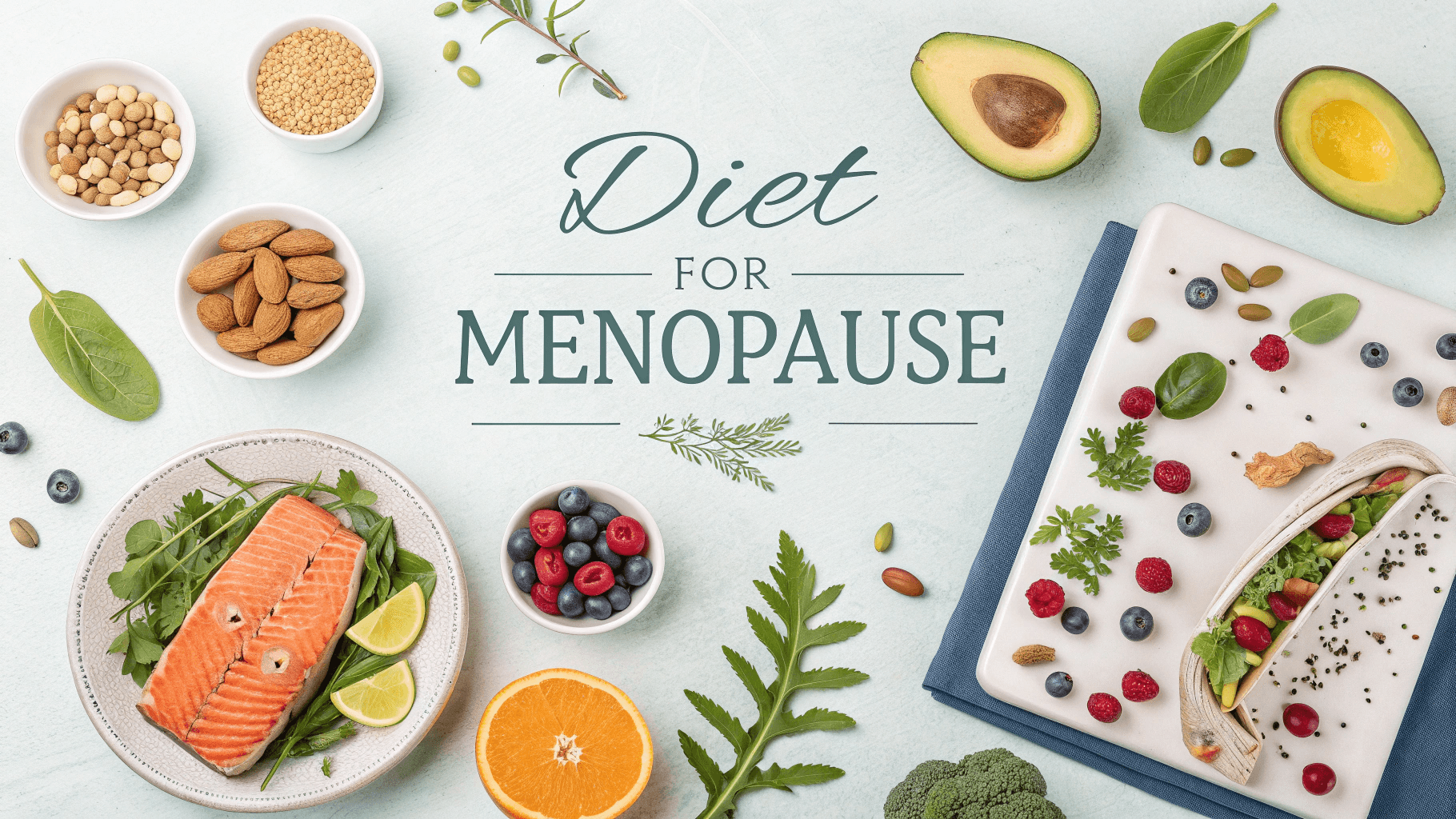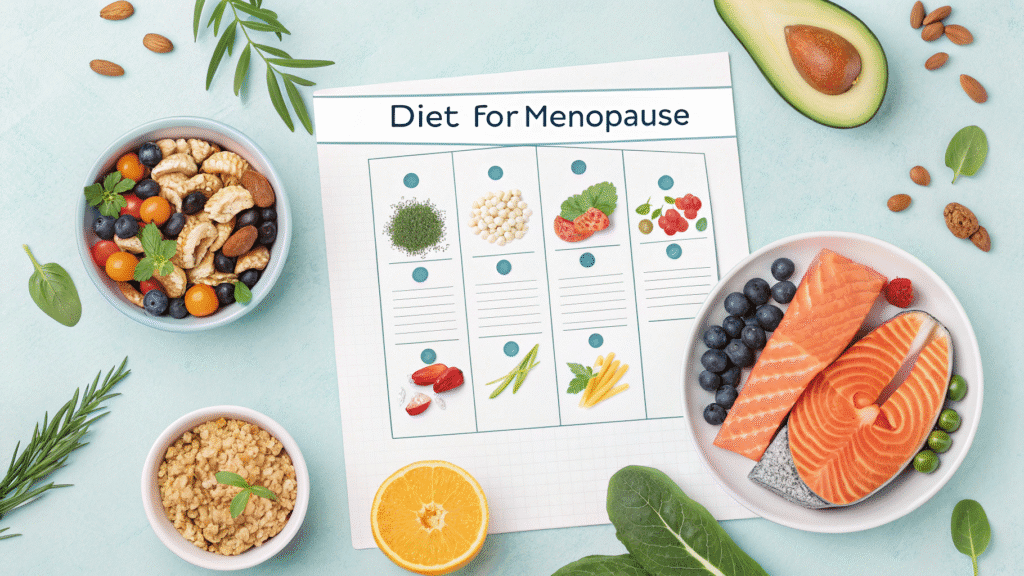Mediterranean Diet for Menopause is a natural and effective way to manage the physical and emotional changes that occur during this stage of life. Menopause, usually occurring between ages 45 and 55, often brings symptoms like hot flashes, mood swings, sleep disturbances, and weight gain. While hormone replacement therapy is common, many women prefer natural solutions.
The Mediterranean diet—rich in fruits, vegetables, whole grains, healthy fats, and lean proteins—offers a balanced approach that supports hormonal health and overall well-being. This guide simplifies how to follow the Mediterranean Diet for Menopause and turn it into a sustainable, symptom-relieving lifestyle.

Mediterranean Diet for Menopause : What Is the Mediterranean Diet?
The Mediterranean Diet for Menopause isn’t a rigid, lab-designed eating plan but rather a time-tested way of eating that evolved naturally from the traditional diets of people in Mediterranean countries like Greece, Italy, and Spain.
This dietary pattern gained global recognition when researchers discovered that those following it had lower rates of heart disease and lived longer—despite enjoying rich, flavorful foods and even regular wine with meals. Its balanced, wholesome approach makes it especially appealing for women seeking natural support during menopause.
At its core, the Mediterranean diet centers around these key principles:
Plant-Forward Focus: The foundation consists of vegetables, fruits, whole grains, legumes, nuts, and seeds, which should make up the majority of your plate at each meal.
Healthy Fats: Unlike many Western diets that vilified fats for decades, the Mediterranean approach embraces healthy fats, particularly extra virgin olive oil, which serves as the primary cooking fat and dressing.
Protein Balance: Animal proteins take a secondary role, with fish and seafood consumed several times weekly, moderate amounts of poultry, eggs, and dairy (particularly yogurt and cheese), and red meat limited to occasional consumption.
Flavor Enhancers: Fresh herbs and spices not only add delicious flavor without excess salt but also provide additional antioxidants and anti-inflammatory compounds.
Mindful Consumption: Beyond specific foods, the Mediterranean lifestyle includes enjoying meals socially, eating mindfully, and pairing meals with moderate amounts of red wine (optional and not recommended for those with certain health conditions).
What makes this eating pattern particularly sustainable is its flexibility—there’s no calorie counting, no strict elimination of food groups, and plenty of room for enjoying delicious meals. Rather than a temporary “diet,” it represents a lifelong approach to eating that focuses on abundance rather than restriction.
Mediterranean Diet for Menopause : Why it Works ?
The Mediterranean diet offers a perfect nutritional storm for women navigating menopause, addressing many symptoms through natural food compounds rather than medication. Here’s why it works so effectively:
Hormone Regulation: Many plant foods in the Mediterranean diet contain phytoestrogens—natural compounds that can gently mimic estrogen in the body. While not as potent as human estrogen or medical hormone replacements, these plant compounds may help ease the transition as natural estrogen declines. Legumes, seeds, and certain vegetables provide these beneficial compounds without the risks associated with hormone replacement therapy.
Cardiovascular Protection: The dramatic drop in estrogen during menopause increases women’s risk of heart disease, previously protected by hormonal factors. The Mediterranean diet’s emphasis on omega-3 fatty acids, antioxidants, and anti-inflammatory compounds directly supports heart health through multiple mechanisms—improving cholesterol profiles, reducing inflammation in blood vessels, and supporting healthy blood pressure.
Inflammation Management: Many menopausal symptoms stem from increased inflammation in the body. The Mediterranean diet is inherently anti-inflammatory, rich in omega-3 fatty acids from fish, monounsaturated fats from olive oil, and thousands of antioxidant compounds from colorful fruits, vegetables, and herbs that combat oxidative stress and reduce inflammation.
Weight Management Support: The notorious “menopause middle”—increased abdominal fat that appears during this life transition—responds particularly well to the Mediterranean eating pattern. The diet’s high fiber content from whole grains, legumes, fruits, and vegetables promotes satiety, while its moderate protein content helps maintain muscle mass that often diminishes with hormonal changes. Studies have shown that Mediterranean-style eating effectively manages weight without the extreme restrictions of other diets.
Hot Flash Reduction: Research suggests that women following Mediterranean eating patterns experience fewer hot flashes and night sweats. The exact mechanism isn’t fully understood, but the diet’s anti-inflammatory properties and ability to support neurotransmitter balance likely contribute to temperature regulation.
Mood Stabilization: The Mediterranean diet has consistently demonstrated protective effects against depression and anxiety—common emotional challenges during menopause. The diet’s omega-3 fatty acids support brain health and neurotransmitter function, while complex carbohydrates help regulate serotonin production, potentially easing mood swings and irritability.
Bone Health Protection: Declining estrogen during menopause accelerates bone loss, increasing osteoporosis risk. The Mediterranean diet’s calcium sources (leafy greens, sardines with bones, dairy), vitamin K (abundant in vegetables), and appropriate protein levels all support bone maintenance during this vulnerable period.
Perhaps most importantly, these benefits come without the side effects often associated with medications or supplements targeted at menopausal symptom relief. The Mediterranean approach works with your body’s natural processes rather than overriding them.
Mediterranean Diet for Menopause : Key Mediterranean Foods for Menopausal Support
The Mediterranean diet’s power for menopausal relief comes from specific food groups that address particular symptoms. Here’s how to strategically incorporate these foods:

Healthy Fats for Hormone Balance
Extra Virgin Olive Oil: Not just cooking oil but medicine in a bottle, containing squalene and polyphenols that may help balance hormones. Use it liberally for cooking, in salad dressings, or drizzled over finished dishes.
Avocados: Rich in potassium and healthy monounsaturated fats that may help reduce hot flashes and support heart health. Add to salads, spread on whole-grain toast, or blend into smoothies.
Nuts and Seeds: Particularly flaxseeds, chia seeds, and walnuts contain lignans (plant compounds with estrogen-like effects) and omega-3 fatty acids. Enjoy a small handful daily as snacks or sprinkled over meals.
Calcium-Rich Foods for Bone Preservation
Leafy Greens: Kale, collards, and bok choy provide highly absorbable calcium without the saturated fat of some dairy products. Aim for at least one serving daily, sautéed with garlic and olive oil or blended into smoothies.
Yogurt: Traditional Mediterranean yogurt (especially Greek and labneh) offers probiotics along with calcium and protein. Choose plain varieties without added sugars and top with honey and nuts for a satisfying snack.
Small Fish with Bones: Sardines and canned salmon with bones provide calcium in a form your body easily absorbs, along with vitamin D that helps calcium utilization. Try them mashed on whole-grain crackers with lemon and herbs.
Omega-3 Rich Foods for Brain and Heart Health
Fatty Fish: Salmon, mackerel, sardines, and anchovies deliver EPA and DHA—omega-3 forms directly linked to reduced depression risk and heart protection. Include at least two servings weekly.
Plant Omega-3s: Walnuts, flaxseeds, and chia seeds provide ALA omega-3s that your body partially converts to the active forms. These make excellent additions to breakfast bowls or smoothies.
Whole Grains for Energy and Mood Stability
Ancient Grains: Quinoa, farro, and bulgur are traditional Mediterranean staples that provide sustained energy without blood sugar spikes, helping maintain mood stability. Use them as the base for grain bowls and salads.
Oats: While not strictly Mediterranean, oats have been incorporated into modern Mediterranean-style diets for their beta-glucan fiber that helps control cholesterol. Overnight oats with Greek yogurt make a perfect menopause-friendly breakfast.
Phytoestrogen-Rich Legumes
Chickpeas and Lentils: These Mediterranean staples contain natural plant compounds that mildly mimic estrogen’s effects in the body. They’re also high in fiber and protein, supporting weight management goals. Aim for 3-4 servings weekly in salads, soups, or as dips like hummus.
Soybeans: While not traditionally Mediterranean, edamame and minimally processed soy products can complement a Mediterranean eating pattern, providing isoflavones that may help reduce hot flashes. Add edamame to grain bowls or salads.
Antioxidant Powerhouses
Berries: Blackberries, strawberries, and cherries are rich in anthocyanins that combat oxidative stress accelerated during menopause. Enjoy as snacks, in yogurt, or blended into smoothies.
Tomatoes: A Mediterranean staple containing lycopene, which may help reduce cardiovascular disease risk. The lycopene becomes more bioavailable when cooked with olive oil.
Fresh Herbs: Oregano, rosemary, thyme, and mint contain concentrated plant compounds that fight inflammation. Use them generously in cooking rather than as occasional garnishes.
Dark Chocolate: A small square of high-cocoa chocolate (70%+) provides flavanols that support circulatory health and may help stabilize mood. Enjoy as an occasional treat with mindful attention to its flavor.
By strategically incorporating these foods, you’re not just following a diet but creating a natural pharmacy specifically targeted to menopausal needs.
Mediterranean Diet for Menopause : Simple 1-Day Mediterranean Meal Plan
Implementing the Mediterranean diet for menopause doesn’t require complex recipes or hard-to-find ingredients. Here’s a straightforward day of eating that incorporates key menopause-supporting foods:
Breakfast: Greek Yogurt Power Bowl
- 1 cup plain Greek yogurt (calcium, protein)
- ¼ cup mixed berries (antioxidants)
- 1 tablespoon ground flaxseeds (phytoestrogens, omega-3s)
- 1 tablespoon walnuts, chopped (omega-3s)
- Drizzle of honey (optional)
Preparation: Simply layer ingredients in a bowl. Total prep time: 3 minutes.
Lunch: Mediterranean Quinoa Bowl
- ½ cup cooked quinoa (fiber, plant protein)
- ⅓ cup chickpeas, rinsed and drained (phytoestrogens, fiber)
- 1 cup mixed vegetables like cucumber, cherry tomatoes, and red bell pepper (antioxidants)
- ¼ avocado, sliced (healthy fats)
- 1 tablespoon extra virgin olive oil mixed with lemon juice and herbs (anti-inflammatory fats)
- Optional: 1 ounce feta cheese (calcium)
Preparation: Combine ingredients in a bowl, drizzle with olive oil dressing. Can be prepared ahead and refrigerated for up to 2 days. Prep time: 10 minutes.
Afternoon Snack: Vegetable Crudités with Hummus
- 2 tablespoons hummus (legumes, healthy fats)
- Assorted cut vegetables: carrots, bell peppers, cucumber (antioxidants)
Preparation: Store cut vegetables in water in the refrigerator to maintain freshness for several days. Prep time: 5 minutes.
Dinner: Sheet Pan Mediterranean Salmon
- 4 oz salmon fillet (omega-3s)
- 1 cup roasted vegetables (zucchini, eggplant, bell peppers) tossed in olive oil, garlic, and herbs (antioxidants)
- ⅓ cup cooked farro or brown rice (fiber, B vitamins)
- Small side salad with olive oil and lemon dressing
Preparation: Place salmon and vegetables on a sheet pan, drizzle with olive oil, garlic, and herbs. Roast at 400°F for 12-15 minutes while grains cook. Total time: 25 minutes active work.
Evening Option: Calming Tea and Dark Chocolate
- Chamomile or mint tea (aids digestion, promotes relaxation)
- One small square of dark chocolate (70%+ cocoa) (antioxidants, mood support)
Hydration throughout the day: Water with lemon or cucumber slices, herbal teas. Optional: one small glass of red wine with dinner if desired and not contraindicated by medications or health conditions.
What makes the Mediterranean Diet for Menopause so effective is not just the individual foods, but how they work together: the combination of fiber, healthy fats, and protein at each meal helps stabilize blood sugar and hormones, while the variety of colorful plant foods delivers a wide spectrum of protective, hormone-supportive compounds.
Mediterranean Diet for Menopause : Tips to Start and Stick to the Diet
Transitioning to Mediterranean eating can be seamless with these practical strategies:
Shop with a Mediterranean Grocery List
Keep these staples on hand to make Mediterranean meals simple:
Pantry Basics:
- Extra virgin olive oil (your primary cooking oil)
- Canned beans (chickpeas, lentils, white beans)
- Canned fish (sardines, salmon, tuna in olive oil)
- Whole grains (quinoa, farro, brown rice, oats)
- Nuts and seeds (walnuts, almonds, flaxseeds, chia seeds)
- Dried herbs (oregano, thyme, rosemary)
Refrigerator Staples:
- Greek yogurt
- Fresh seasonal vegetables
- Lemons and garlic
- Fresh herbs when possible
- Small amounts of feta or goat cheese
Shop the perimeter of the grocery store first, focusing on fresh produce, then add pantry items as needed. Consider local farmers’ markets for the freshest seasonal produce.
Prep Smart to Stay Consistent
Batch Cooking: Dedicate 1-2 hours weekly to prepare:
- A large pot of grains
- Roasted vegetables
- A bean-based dish like lentil soup
- Cut raw vegetables for snacking
Homemade Basics: Prepare simple Mediterranean staples that store well:
- Hummus and bean dips
- Mediterranean salad dressing (olive oil, lemon, herbs)
- Overnight oats with Greek yogurt
Component Cooking: Rather than complete meals, prepare mix-and-match elements that can create different meals throughout the week.
Focus on Colorful, Varied Plates
The traditional Mediterranean diet naturally incorporates variety through:
- Eating seasonally (when food is most nutritious and flavorful)
- Aiming for 3 different colored vegetables daily
- Rotating proteins throughout the week (fish, legumes, occasional poultry)
- Experimenting with different herbs and spices
This variety not only prevents boredom but ensures you receive a wide spectrum of nutrients and beneficial plant compounds.
Embrace Mindful, Social Eating
The Mediterranean approach isn’t just about food choices but how you eat:
- Eat sitting down at a table, not standing or driving
- Turn off screens during meals
- Pause before eating to appreciate your food
- Share meals with others when possible
- Slow down and chew thoroughly
These practices enhance digestion and prevent overeating, particularly important during menopause when metabolism typically slows.
Gradually Limit Less Supportive Foods
Rather than strict elimination, gradually reduce:
- Highly processed foods with long ingredient lists
- Added sugars (which exacerbate hot flashes for many women)
- Excessive red meat (limit to once weekly)
- Industrial seed oils (replace with olive oil)
Focus on adding beneficial foods rather than creating a sense of deprivation.
Lifestyle Pairings for Better Results
The Mediterranean approach extends beyond food to encompass a lifestyle that supports menopausal well-being:
Physical Activity for Symptom Relief
Walking: Perhaps the most quintessential Mediterranean exercise, daily walks of 20-30 minutes, especially after meals, improve insulin sensitivity and help manage weight changes common during menopause.
Strength Training: Twice-weekly resistance exercises help maintain muscle mass and bone density that naturally decline with reduced estrogen. Simple bodyweight exercises like squats, modified push-ups, and lunges require no special equipment.
Mind-Body Practices: Yoga and tai chi are particularly beneficial during menopause, combining movement with stress reduction that may help manage hot flashes and mood fluctuations.
The key is consistency with moderate activity rather than intense but unsustainable exercise programs.
Stress Management Techniques
Chronic stress exacerbates many menopausal symptoms through cortisol’s effects on other hormones. Mediterranean cultures traditionally incorporate:
Midday Rest Periods: Even short 10-minute breaks to close your eyes and breathe deeply can reset stress hormones.
Connection with Nature: Regular time outdoors, tending plants or simply walking in natural settings, reduces cortisol levels.
Creative Expression: Simple acts like cooking, arranging flowers, or musical enjoyment activate relaxation responses.
Meditation and Breathwork: Just 5 minutes daily of deep breathing can significantly reduce hot flash frequency and intensity for many women.
Sleep Prioritization
Menopausal sleep disruption creates a vicious cycle of worsening symptoms. Support better sleep by:
- Maintaining consistent sleep and wake times
- Creating a cool sleeping environment (65-67°F is ideal)
- Limiting screen exposure before bedtime
- Considering moisture-wicking sheets and pajamas if night sweats occur
- Using relaxing herbs like chamomile or lavender as evening teas
Hydration Strategy
Proper hydration becomes increasingly important during menopause:
- Aim for 8-10 cups of fluid daily
- Emphasize plain water, herbal teas, and water-rich foods
- Consider room temperature rather than ice-cold beverages, which some women find trigger hot flashes
- Limit caffeine, especially after midday
- If night sweats occur, keep water by your bed
Together, these lifestyle elements create a comprehensive approach that addresses menopause holistically rather than attempting to tackle symptoms in isolation.
Mediterranean Diet for Menopause : Final Thoughts
The mediterranean diet for menopause stands out for its simplicity, sustainability, and proven health benefits. Unlike restrictive diets, this approach embraces satisfying, flavorful foods that help ease hormonal shifts naturally.
Studies show that it not only supports symptom relief—like hot flashes and mood changes—but also promotes long-term health by protecting the heart and strengthening bones, which is crucial after menopause.
Rich in anti-inflammatory, plant-based foods, the mediterranean diet for menopause offers a gentle, nourishing way to manage this transition. You don’t need perfect adherence; small changes—like swapping butter for olive oil or adding more vegetables and legumes—can lead to real improvements in how you feel.
While it may not eliminate every symptom, this diet complements medical care and empowers women to take control of their health with each bite. It’s not just a way of eating—it’s a sustainable lifestyle that honors the body during a powerful phase of life.





